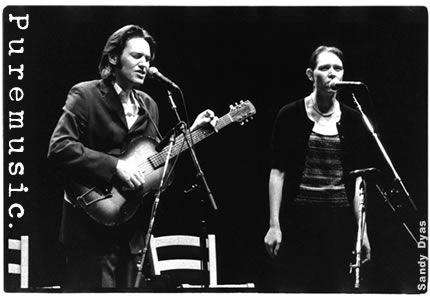
The Ghostly
Ones (continued)
When Welch and Rawlings sing together, their voices fit so tightly that they seem welded. One of their newer songs--it doesn't yet have a title--is almost hypnotically slow and includes several passages sung in unison. Welch says that sometimes she loses the sense of which voice is hers and which belongs to Rawlings.
Rawlings's ear for harmonic possibilities is impish. He does not always match Welch's phrasing. His line sometimes anticipates what Welch is singing, then meets hers and continues in another direction. He likes intervals that are closer than those commonly used. At certain moments of tension, their voices seem to be leaning against each other, like cards in a card house, which is a bluegrass effect.
Rawlings is a strikingly inventive guitarist. His solos often feature daring melodic leaps. He uses passing tones as signal elements of a solo rather than relying on them merely to bridge chord changes, and there is an obstinate, near-vagrant quality of chromatic drifting to his playing--of his proceeding with harmonic ideas at a different pace and perhaps even in a different direction from the song's changes. He uses double and triple stops and open strings for dramatic effect. Often, he leaves an open string ringing as a drone against which he plays a note that conflicts with the chord the drone refers to. He likes to go as far out on a limb as he can before figuring out how to get back. In Carrboro, he played a solo that seemed as if it were going to skid right off the pavement and recovered itself only at the very last moment. The crowd applauded the simple audacity, and a woman beside me, clearly familiar with his playing, began laughing and shaking her head. "Of course he ends it there," she said to her companion. "Why wouldn't he?" In the dressing room afterward, I asked Rawlings how he would describe his playing, and he said that he simply has a fondness for certain notes and he finds ways to play them. When I asked which notes they were, he shrugged and said, "The ghostly ones."
Rawlings plays a peculiar guitar. It is a 1935 Epiphone Olympic, with an arch top, and f-holes on the face, like a violin, and even when it was new it was a cheap guitar. He may be the only musician who has ever made it his principal instrument. The sound is so unusual that, once when Welch and Rawlings were appearing at a festival where the blind guitar player Doc Watson was also performing, Watson came up to Rawlings while he was warming up and said, "Son, what kind of instrument is that?" In 1997, Rawlings bought a Fender Esquire, an electric guitar, and wanted to use it, so he and Welch got a friend to play drums, and Welch played the electric bass and they began playing clubs as the Esquires. They never announced their performances, and not many people came. They played songs by Neil Young and the Rolling Stones, among others, and Rawlings sang most of them. The Esquires brought to their gigs a complete book of Dylan songs, and once during each evening the audience was allowed to shout out a number. Welch and Rawlings picked one, then turned to the corresponding page in the Dylan book and played whatever song was on that page. Rawlings says that, for the most part, their playing was "a two on a scale of ten." They last played in 2002.
"The Esquires' big gig was New Year's, because no one would ever hire me and Dave to play New Year's," Welch said. "So we were always free."
The most compelling element of a Welch and Rawlings performance is their deep and, so far as I know, unexampled engagement with each other. Welch's mother and father once asked me if I had ever seen Welch and Rawlings rehearse. I said that I hadn't. "Whatever happens in the ear to people listening profoundly to each other is happening in an extreme fashion between them," he said.
"You know not to interrupt," she said.
"There's a kind of supersensitivity," he said.
"And respect," she said.
"It's like they're breathing together," he said. "They get lost in there."
"We were a little scared," she said. continue
print (pdf) listen to clips puremusic home